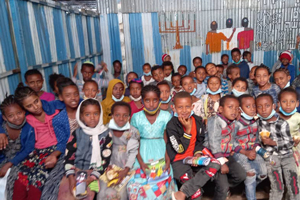
Aliyah and Integration: Two Sides of the of the Same Coin
There is an urgency to bring thousands Ethiopian Jews home to Israel and help them integrate successfully into Israeli society.
Why the Rush to Make Aliyah?
The latest reports on the situation in Ethiopia show that the civil war in the country is worsening. The country’s military has lost several recent battles to Tigray rebels, who are threatening to storm the capital, and a state of emergency has been declared. Israel’s Integration Minister Pnina Tamano-Shata wrote: “The precarious security situation directly affects the members of the community waiting in Ethiopia, endangering their lives and demanding immediate government action to quickly bring them on Aliyah”.
As we anticipate this wave of Aliyah from Ethiopia, the ICEJ appeals to our Christian friends who faithfully support the return of the Jewish people to the Promised land, to take an active part during this crucial time to bring the remaining members of this Jewish community to Israel.
Thousands of Ethiopian Jews have been waiting anxiously for years to receive the news that they can come to Zion. Let us unite our efforts to rescue these Ethiopian Jews at such a critical time as this.
In addition to helping these precious people make Aliyah, the ICEJ is also concerned about their integration into Israeli society, as we know that they will face many struggles along the way.
Why the Need for Integration Assistance?
The jump from a patriarchal and communal way of life in Ethiopia to the modern, highly educated, and egalitarian society in Israel can be quite a cultural shock, and one that can shift family dynamics in challenging ways. When conflict occurs or decisions need to be made within the family, often the young people – who more quickly pick up the language – need to guide their parents and grandparents in their daily lives. This contradicts the accepted model of family life in Ethiopia, where elders are always respected and consulted.
Not only are there language barriers, but educational achievement is generally vastly lower than the expected norms in Israel as well. This leaves children with the need to bridge gaps that their parents are unable to assist them with, a disadvantage that follows them as they grow up. Parents without adequate training also struggle to find suitable employment in this new reality, a fact which leaves them vulnerable.
This is why Ethiopian leaders throughout Israel highlight education as critical for integration and advancement into Israeli society. Nevertheless, even after investing the time and effort to study, often Ethiopian graduates struggle in finding employment commensurate with their level of education, and they feel the lack of opportunities and equality. This difficulty finding employment has several roots. Some are cultural, others practical; however, most of the Ethiopian Israelis admit that their community is not generally viewed as professional or educated, a perception that must slowly be overcome.
In response, the ICEJ supports targeted mentoring programs to help bridge these educational and societal gaps to ensure the success of younger members of the Ethiopian community in Israel.
Will you help provide travel costs and integration assistance for 200 olim due to arrive in December?



